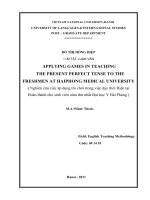The past perfect tense
Bạn đang xem bản rút gọn của tài liệu. Xem và tải ngay bản đầy đủ của tài liệu tại đây (61.08 KB, 1 trang )
The past perfect tense
I/ Form: (cách thành lập)Active: s + had / hadn t + p
2
+ (o) + I hadnt
locked the door before I went out yesterday.After they had come back home, they worked
very hard. Passive: o + had been / not been + p
2
+ (by s)The house had
been built by the time I got married.They hadnt been told about the accident before they
met Hung. II/ usage: (cách sử dụng) - Diễn tả một hành động xảy ra trớc một
hành động khác ở trong quá khứ. Vd: Last night, he phoned me after I had gone to bed. (Tối
qua anh ấy gọi điện cho tôi sau khi tôi đã đi ngủ rồi)Hành động xảy ra sau đợc diễn tả ở thời
quá khứ đơn giản (Simple past tense), tơng tự cách chia động từ phone.Các từ hay đợc dùng
để liên kết hai hành động kiểu nêu trên là: before, after, by the time (khi), when. Lu ý khi
đặt các từ này ở đầu câu phải dùng dấu phẩy để tách hai hành động. Vd: By the time I arrived,
Nam had gone. (Khi tôi đến thì Nam đã đi rồi) - Diễn tả hành động trong mệnh đề
phụ( IF) của câu điều kiện loại 3 (Điều kiện không thể thực hiện đợc ở quá khứ) Vd: If he
had invited me, I would have come to the party. (Nếu nó mời tôi thì tôi đã đến dự tiệc). Nhng
vì nó chẳng mời tôi nên tôi đã không đến dự. - Diễn tả hành động trong câu thể hiện
điều ớc muốn về quá khứ (S + wish + S + had/hadnt P
2
+ hoặc If only + S + had/hadnt P
2
+ ) Vd: I wish I had gone to Ha Long last summer/ If only I had gone to Ha Long last
summer. (Ước gì hè năm ngoái tôi đi Hạ Long). Nhng tôi đã không đi vì một lý do nào
đó. exercise: Give the correct form of the verbs in brackets.1. If I (know) that you were
in hospital, I (visit) you.2. He would have understood you if you (not speak) too
quickly.3. When I (open) the door, I (see) a man on his knees.4. She (have)
breakfast before she (go) to school this morning.5. He had an accident. If only he (not
ride) so fast.6. I (not get) good marks last semester. I wish I (study) harder.
lời nói gián tiếp - indirrect speech (exclamations - câu cảm thán) Kiểu
câu: What (a/an) + adj + n ! hoặc How + adj + S + be ! Chuyển thành:
exclaimed / said that + S + be + adj Hoặc exclaimed / said that it/ they + be + adj +
(a/an) + n ( đã thốt lên / nói rằng )Vd: 1. Hoa said, What a nice flower! đ Hoa
exclaimed / said that the flower was nice hoặc Hoa exclaimed / said that it was a nice
flower.1. Hoa said, What nice flowers! đ Hoa exclaimed / said that the flowers
were nice hoặc Hoa exclaimed / said that they were nice flowers.2. Nam said, How
beautiful her hair is! đ Nam exclaimed / said that her hair was beautiful hoặc Nam
exclaimed / said that it was beautiful hair.3. Nam said, How noisy the students are!
đ Nam exclaimed / said that the students were noisy hoặc Nam exclaimed / said that they
were noisy students.exercise: Change these sentences into indirrect speech.1. What a
good book!, Lan said.2. How lovely the cat is!, they said.3. What a delicious
meal!, my father said.4. What big houses!, the boy said.5. Thu said, How slow
he is!.6. How strong the players are!, said Long.7. What an expensive car!,
the man said.8. How lucky I am!, said Ba.









